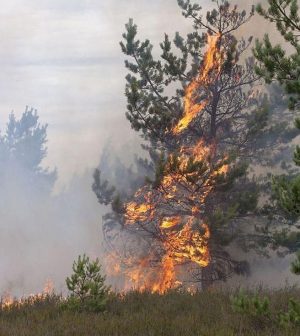- The Best Time of Day to Drink Bone Broth to Maximize Health Benefits
- 8 Ways to Increase Dopamine Naturally
- 7 Best Breads for Maintaining Stable Blood Sugar
- Gelatin vs. Collagen: Which is Best for Skin, Nails, and Joints?
- The Long-Term Effects of Daily Turmeric Supplements on Liver Health
- Could Your Grocery Store Meat Be Causing Recurring UTIs?
- Are You Making This Expensive Thermostat Error This Winter?
- Recognizing the Signs of Hypothyroidism
- 10 Strategies to Overcome Insomnia
- Could Artificial Sweeteners Be Aging the Brain Faster?
Double Trouble: Wildfire Smoke Could Boost Odds for COVID’s Spread

Breathing in smoke from wildfires may significantly increase the spread of COVID-19, researchers say.
The warning, from a new study of links between smoke-caused air pollution and SARS-CoV-2 infections, comes as firefighters battle 80 large wildfires in the western United States. The largest — 300 miles south of Portland, Ore. — covers over 500 square miles.
For this study, researchers compared levels of fine particulate matter (PM 2.5) from wildfire smoke with rates of positive SARS-CoV-2 tests in a large health care network serving Nevada and northeast California.
The takeaway: PM 2.5 from prolonged wildfire smoke was tied to a nearly 18% increase in COVID-19 cases between Aug. 16 and Oct. 10, 2020.
“Our results showed a substantial increase in the COVID-19 positivity rate in Reno during a time when we were affected by heavy wildfire smoke from California wildfires,” said co-lead author Daniel Kiser, an assistant research scientist at the Desert Research Institute (DRI) in Reno, Nev.
The researchers said Reno was exposed to higher PM 2.5 levels for longer periods in 2020 than other nearby cities. For example, Reno had 43 days of elevated PM 2.5 during the study period, compared to 26 in the San Francisco Bay area.
Kiser noted that COVID-19 cases are also rising this summer across the American West.
The findings were published July 13 in the Journal of Exposure Science and Environmental Epidemiology.
Study co-lead author Dr. Gai Elhanan, an associate research scientist at DRI, said, “We believe that our study greatly strengthens the evidence that wildfire smoke can enhance the spread of SARS-CoV-2.”
The new research builds on previous studies by controlling for factors such as rates of the virus, air temperature and number of COVID-19 tests administered, in a location with heavy wildfire smoke.
“We would love public health officials across the U.S. to be a lot more aware of this because there are things we can do in terms of public preparedness in the community to allow people to escape smoke during wildfire events,” Elhanan said in a DRI news release.
More information
The U.S. Centers for Disease Control and Prevention has more on COVID-19.
SOURCE: Desert Research Institute, news release, July 15, 2021
Source: HealthDay
Copyright © 2026 HealthDay. All rights reserved.










